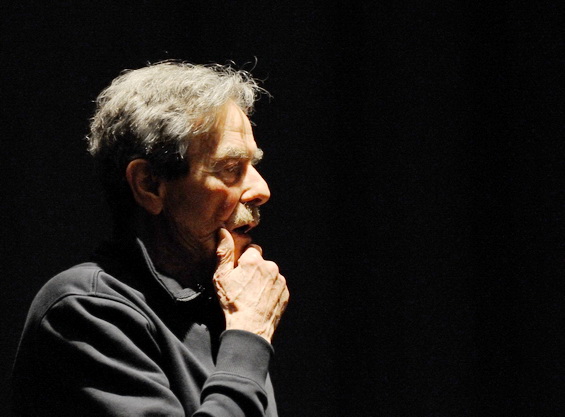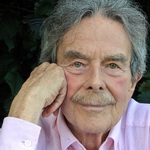Ishu from the German Osho Times interviews Satyananda.
Finally a new book from Satyananda! The former Stern reporter, who created a sensation with his best-seller Totally Relaxed in the Here and Now at the end of the seventies, has now published a collection of his essays written in the past 14 years, entitled Raus aus der Komfortzone – Sprung in die Freiheit (Out of the Comfort Zone – Jump into Freedom). As one can expect, it is brilliantly written and inspiring. We asked Satyananda what Osho’s message of celebration means today.

Can you celebrate life in a world that is at the edge of the abyss?
This is the great art! We have to become aware that we perceive the world according to our own condition. There are people who become depressed when they observe the world, and then there are others who not only see the dark side but say, the world is the way it is, I keep my distance and am awake. Buddha said it this way: “Be in the world and not of the world.” For me this “being in the world” means, do what you have to do and observe. And my understanding of “Not being of this world” is not to identify with the insanity that surrounds us 24 hours a day. In addition, the state of the world is rather a challenge which confronts me with the question, “Is there maybe a chance that the current situation with its challenges can help me sharpen my awareness?”
Osho frequently said, “My message is celebration!” How do you understand that?
If I have understood Osho correctly, it is about positive attitude. Not about partying, but rather finding inner serenity, our own center – harmony of body, mind and spirit. For me celebration is meditation: gradually the awareness arises that I am in good hands with existence. I can trust. Whatever happens is okay with me. This is the approach of “celebration”…
When in 1977 you came as a Stern reporter to the ashram in Pune you already had seen so much of the world and met so many interesting people. What had fascinated you so much about Osho that you decided to stay?
First I was fascinated by Osho’s daily discourses that I attended every morning. The rational mind of the reporter Elten was impressed by their intellectual and rhetoric brilliance. But already after two days I wrote a sentence in my diary, which surprised me, “This is about life and death.”
That sounds highly dramatic! How did this happen?
My subconscious probably connected with very very old experiences, which had to do with life and death – the death of the ego of course. Suddenly Osho seemed eerily familiar to me and I had the overwhelming feeling, “I have arrived! Here is my home!” My journalistic mind reacted with a shrill warning: “Watch out, the man is a charlatan!” I took the warning signs very seriously indeed. But in the end, trust won over scepticism.
“There you are at last,” said Osho and spread his arms wide when I met him for the first time, “I’ve been waiting and waiting for you. I recognise my people, when they come to me…” That was it. A year later I moved into the ashram and meditated for eight years close to Osho. The reporter vanished. The spiritual seeker followed his inner voice.
How did your journalistic perception change through Osho?
I realised that I do not perceive the world as it is but rather through the lens of my projections. I can only perceive reality after I have understood my own reality – my prejudices and my quirks. That’s why I also think that meditation should be part of the curriculum in every school of journalism, because meditation has a lot to do with perception of reality. When you are totally dominated by your projections, fears, hopes and wishes and so on, you are stewing in the cage of your unconsciousness. You have to get to know yourself first, before you can see the world as it really is.
Can you say what is the essence of Osho’s message for you?
I cannot explain it in one word. Spontaneously I would say, his message is that everyone needs to take responsibility for themselves. Osho came up with so many feats so as not to be worshipped as a saint. He consistently fought against being considered a father figure who would, around the clock, take care of his little sheep. Those who listened attentively to his lectures couldn’t have the slightest doubt that they had to find their own way. The message is clear: “I alone am responsible for what I think and do!”
Next I remember Osho’s message that I am not an island in the universe. Osho helped me see myself as part of the whole and to feel that too. The Indian Sufi poet Kabir talks about the drop that dissolves in the ocean; a wonderful metaphor. I am the drop and I feel at home in the ocean. Is there anything else? Yes of course: in Osho’s therapy groups I dealt extensively with my weaknesses, for example with my narcissism, my tendency not to show my feelings, to speak more than to listen, to hide behind masks… These were sometimes very painful insights, but fascinating!
After a hiatus in Pune, and later in Oregon, you went back to journalistic work. In the [German] Osho Times we have benefitted for years from your inspiring columns. Now you are publishing a selection of your essays that you wrote in the past 14 years, Raus aus der Komfortzone – Sprung in die Freiheit (Out of the Comfort Zone – Jump into Freedom). Is there such a thing as a common thread?
Those essays were not about commenting on events with fleeting actuality. My focus was on the powers behind the scenes. Where do they come from? In which direction are they moving? Last but not least what is our relationship to these powers? Can we help shape them or are we at their mercy? When I started as a twenty-year old journalist in 1947, I wanted to change the world. I imagined my work could contribute to strengthen democracy, to stand up for minorities, to fight against corruption, etc. I tried to do my work in this spirit. But then, suddenly, at age 49, I became aware that my approach to try and improve the world was completely naive, or even arrogant. Although my articles were read with relish and found to be interesting, they have changed nothing!
Why are you so sure? Particularly when you think about ’68 and the revolution that suddenly engulfed large parts of society; you could have had the impression that something is changing, to which you – as a journalist – have contributed something.
The feeling is tempting, right? (laughs) But completely unwarranted! What has actually improved? Have people become more honest, less anxious, less aggressive, less greedy? Is there more love and less corruption? Has the economy become more social? Is there such a thing as free enterprise? Tell me one area where something has fundamentally moved in the right direction.
For example, it is now easier for minorities to have their place in society. Gays and lesbians are no longer on the outside as they were in the 60’s…
Okay, as gays and lesbians are concerned, something has really changed. But I cannot see that this is true for minorities in general. Think about the poor refugees who cross the water in floating coffins, from Africa and the Middle East, and drown in the Mediterranean just because we don’t want to let them enter legally and grant them asylum.
So eventually it became clear to you that you can’t change the world as a journalist.
Above all I realised that I have to start with myself! I had to do something with myself to reach a different level of perception. One that is not so much influenced by external circumstances, but rather follows the inner compass and then maybe also leads to other insights. I then tried to write my columns and essays in this sense. For example, the question that I posed to myself was always the same: what is our share of the global financial crisis? And then, if you tick a little different than the general public, you come to the following realisation: If there were no greedy people, we would not have a financial crisis! The hostile financial industry can only exist in a greedy environment. Aren’t we all greedy? Isn’t it true that we are constantly on the lookout for a richer return for our savings? And then the sober realisation: we don’t differ at all from the bankers who sit high up in the boardrooms of their corporation skyscrapers – except that the bankers are closer to the trough.
You write in the preface to your new book that ‘society’ is about the same as ‘matter’. “The reality of matter are molecules. Only when molecules change, can matter change. For society the same applies: it changes when people change.” For you, change can therefore only come through the individual?
Yes! I owe this insight to Osho. The focus must be on the individual – not on society or our socio-economic system. These are all just abstract concepts. I cannot fight the financial crisis by condemning bankers who, in turn, are the product of this milieu where greed rules. And the root of greed is fear. And if we go a bit deeper, we ask ourselves: Where does fear come from? It comes from the fact that we don’t feel well-grounded in existence. We feel we are at its mercy – and that has something to do with loss of spiritual substance, which has been getting worse since decades. We have lost contact with God – or whatever you want to call it – to nature, to the whole. That’s our problem.
We live in a time when many certainties have been shattered; do you see this as an opportunity?
Yes, I am convinced that it is a great opportunity. What we have now is an economic system that is ruining the planet and the planet is fighting back. That’s how I understand the disasters that are increasing everywhere. Chernobyl, Fukushima, the typhoon that wiped out a city with 200,000 inhabitants in the Philippines, devastating floods everywhere – and that’s probably just the beginning. We are entering a phase where nothing remains as it once was. Of course now we can try to oppose this upheaval. But this is not going to make us happy. We must try to use the upheaval as a positive momentum. For me, positive changes have only come after I walked through the valley of tears. In other words, only when I’ve felt in the dumps did I wake up and learn something. And that’s what I also see for society: it will only change if a critical mass of intelligent individuals discover meditation and understand the crisis as a chance for their own transformation.
Are you an optimist?
Of course! We are currently experiencing that meditation has arrived in the mainstream. The media is dealing with meditation and recommending its positive effects. For example against burnout, sleep disorders, poor concentration and so on and so forth…
Nevertheless, we don’t hear or read much about the spiritual aspect of meditation, which is the most important thing. How do you explain that?
I think that’s actually quite normal. The spiritual aspect of meditation will become a media topic the moment many people have had spiritual experiences during mediation. Initially there are other, more practical matters to be solved. For example the question: Is it perhaps time to break out of my comfort zone and free myself from the dictates of my need for security? Millions of people drive every morning, at the same time, to the same workplace. There they always encounter the same colleagues and complete tasks they haven’t been interested in for a long time. In that way hours, days and years go by in robot mode. The routine increases constantly and the vitality implodes. The robot existence strengthens the illusion of safety. What worked yesterday shouldn’t that also work tomorrow? This is exactly the attitude that works in our time of upheaval – like a suicide strategy.
Recent surveys have shown that the Germans are predominantly satisfied with their lives. How can that be?
For me it is a sign that the entertainment industry is uncannily successful. Every evening they pin millions of people to their TV couches, transport them into dream worlds and suggest that somehow everything will go well, for example, with climate change and getting into debt.
Robots cannot celebrate life. This requires a fresh and clear perception. Isn’t it very important to break up automatic routines again and again, especially in regard to our main subject of celebrating life?
Absolutely! I fastidiously take great care that my daily routine does not solidify in routine. I don’t get up at the same time every day; I brush my teeth sometimes with my left hand and change again and again what has become a habit. The only time I don’t do that is while I am driving! (laughs) I stop automatically at red and step on the gas at green. De-automation is a major issue of our time. If we live in robot mode, our creativity dies. Yet our creativity is the only security we have. And one more thing: routine kills our curiosity and makes us dumb. Intelligence is unprejudiced curiosity!
Interview by Ishu, first published in the German Osho Times (Jan 2014) – www.oshotimes.de
Translated by Ramita with editing from Osho News
 Satyananda (aka Joerg Andrees Elten) was born in Dresden, Germany, and survived WW2. A well-known international political reporter for Stern Magazine, he was assigned in 1977 to report about Osho and the ashram; he became a sannyasin, dropped his career and lived at the ashram. His first book about his experiences, ‘Totally Relaxed in the Here and Now’ became an instant hit. He lives in Northern Germany and gives seminars and workshops at the ‘Institute for Creativity and Meditation’ together with Gitama. He writes articles about current affairs and spiritual themes and is frequently invited as a public speaker. He is working on his autobiography. www.hierjetzt.de
Satyananda (aka Joerg Andrees Elten) was born in Dresden, Germany, and survived WW2. A well-known international political reporter for Stern Magazine, he was assigned in 1977 to report about Osho and the ashram; he became a sannyasin, dropped his career and lived at the ashram. His first book about his experiences, ‘Totally Relaxed in the Here and Now’ became an instant hit. He lives in Northern Germany and gives seminars and workshops at the ‘Institute for Creativity and Meditation’ together with Gitama. He writes articles about current affairs and spiritual themes and is frequently invited as a public speaker. He is working on his autobiography. www.hierjetzt.de
Related book review: Out of the Comfort Zone – Jump into Freedom
Related discourse by Osho: You have escaped to reality




Comments are closed.